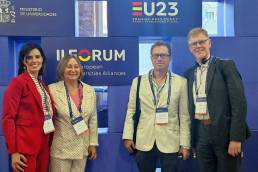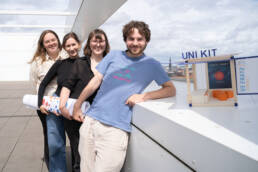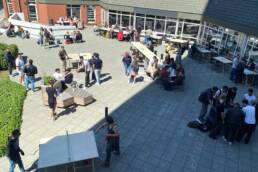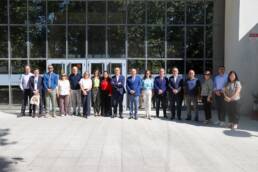The Spanish Presidency of the Council of the European Union has organised the 2nd Forum of European Universities Alliances, held on 14 and 15 September in Barcelona. The venue chosen was the former Fabra i Coats textile factory, an industrial heritage site that is now a space for creativity, which is in keeping with the spirit of these alliances. STARS EU was present at this important meeting attended by 430 higher education institutions from 35 countries (EU members plus Iceland, Norway, Albania, Bosnia and Herzegovina, Montenegro, North Macedonia, Serbia and Turkey).
The project coordinator, Rima Dijkstra, from the Hanze University of Applied Sciences (Netherlands), attended on behalf of STARS EU, accompanied by Gunnar Peterson, from the West University (Sweden); Vera Ferro-Lebres, from the Polytechnic Institute of Bragança (Portugal); and José Sigut, from the University of La Laguna (Spain).
The first meeting of the alliances was organized during the French Presidency of the Union, in June 2022. The objective of this second forum has been to offer a space for dialogue and exchange of ideas to address the most important issues currently affecting the alliances.
Rima Dijkstra values in a high positive way this meeting in which 50 alliances gathered to listen new directions for European University Initiative provided by the European Commission and share the results achieved. “The forum was an open space for dialogue and exchange of ideas around the most important issues currently affecting alliances”, she explains . Among the many topics discussed were the legal status of alliances and the European Degree label, research and innovation activities of the alliances and how to bring the European Universities initiative closer to European society.
“Its was very interesting to discuss, learn and share with colleagues from other European Universities alliances, to compare STARS EU Alliance results and achievements with the results of long-term existing alliances funded under the EUI 1st and 2nd calls”, says Dijkstra. “After participating in the parallel sessions and discussions, we can conclude that STARS EU strategy and action plan are very much in-line with the EUI and, in many cases, our achievements and strategic directions are even ahead of other alliances”.
In addition to delegates from the universities themselves involved in the different alliances, these more than 400 participants also include representatives of the European Commission, state members, student associations, quality agencies from the various countries and other university associations.

To carry out this forum, there has been close collaboration with the alliances themselves and with the European Commission to determine the topics, the moderators and the people who participated in each session. Furthermore, once concluded, participation mechanisms have been planned so that the discussions extend beyond the Spanish Presidency of the Council of the European Union.
During these two days of work, issues such as the “transformative potential and challenges for national governments and institutions” will be discussed with the presence of State Secretaries from Member States, where the commitment to improve the quality and competitiveness of the European universities, the recognition of diversity, university autonomy and the need to develop non-predefined activities and cooperation formulas.
The way to bring the “European Universities” initiative closer to European society has also been addressed; the strategy for the creation of a joint European degree label to facilitate higher education institutions involved in transnational cooperation in offering joint programs and obtaining joint degrees; or the social dimension of European universities and how they have to create a desired inclusive environment in higher education, which promotes equality and diversity and responds to the needs of local communities.
Opening

The II Forum was inaugurated by the acting Spanish Minister of Universities, Joan Subirats, together with the Vice President for the Promotion of the European Lifestyle of the European Commission, Margaritis Schinas; the head of the Department of Research and Universities of the Generalitat of Catalonia, Joaquim Nadal; and the mayor of Barcelona, Jaume Collboni.
Minister Joan Subirats presented the event emphasizing that the university alliances follow in the footsteps of one of the most efficient and successful proposals that the EU has had and that has contributed the most to European construction: the Erasmus program. “The Alliances aim to transform and strengthen the union of universities, the union of knowledge and talent and project it to the world”.
The vice president for the Promotion of the European Lifestyle of the European Commission, Margaritis Schinas, considers that these alliances represent a process of transformation of the European Higher Education system where a common space for university training “based on in the convergence of curricula, mobility, understanding and the European spirit.” Shinas also considered the Erasmus program “the jewel in the crown of European integration. It is, by far, the most successful story in building this mentality of coexistence, of diversity, of understanding among young Europeans.”
Related Posts
July 10, 2025
STARS EU: An intercultural pavilion for a European campus
The Interspace project, developed by students from nine European universities,…
July 7, 2025
“Interspace – O(ut)er Campus” begins with the final project presentation at the Bremen University of Applied Sciences
The project will evolve into a BIP, with its first phase to be developed within…
July 7, 2025
UAMD delegation visits Bragança Polytechnic University to strengthen strategic collaboration
The meeting served to bring together positions in areas as important as…




